#when it came to russia invading ukraine
Text
.........
#man i wonder why tumblr users could effectively recognize that citizens (even when a lot of them support it) arent their government#when it came to russia invading ukraine#but cant do the same when it comes to israel#like yeah fuck the occupying settler colony that calls itself israel but man#ive been seeing things online recently (thankfully not from people i trust)#that is borderline or just outright antisemitic 'all jews are a hivemind' recently
4 notes
·
View notes
Text

Just went on facebook to check on some items I'm selling (basically the only time I use that cursed website) and this post I wrote 10 years ago came up in my fb memories. *sigh* Times don't change, except now I rant about all the horrible shit Russia is doing to Ukraine on tumblr instead of fb.
#I've been super interested in Ukraine since Euromaidan and my interest has not waned at all these past 10 years#I'm not even Ukrainian or have family from there#(my family mostly came from Hungary/Serbia)#but I still think the Ukrainian fight for democracy is important#can't believe I was a senior in high school when Euromaidan was occurring#I had so much hope once Yanukovich was ousted/fled#then the first invasion of Ukraine (Crimea/Donbas/Luhansk) occurred after the 2014 winter Olympics and my heart just fucking sank#for Ukraine and all the citizens who died or were displaced#I remember when certain people were trying to convince the world that Russia's 1st invasion of Ukraine was actually a civil war between#Russian speaking/oriented Ukrainians and Ukrainian speaking/Western oriented Ukrainians#🤡🤡🤡🤡#give me a fucking break#it breaks my heart Ukraine was invaded for a 2nd time and that Western support for Ukraine is waning#I pray with all my heart that Ukraine comes out of all this stronger and that they kick Russia out#fuck tankies who say the past 10 years has been a war between the so-called imperial west/NATO#and Russia who waa betrayed by the West#sorry for the long rant#this is just something I really care about#kvietka rambles
3 notes
·
View notes
Text
now i like hannibal (bryan fuller nbc) but mads mikkleson is not doing any accent and if you've spoken to like more than one lithuanian ever the idea of that being where hannibal is from falls apart pretty quickly
#ephemeriee.txt#half of management at the bar i work at are lithuanian#and my uni course has loads of exchange links with a uni in kaunas#i'm odd for not having gone to lithuania#but when the trip opportunity came up it was shortly after russia invaded ukraine and i was not taking any risks#i've just watched the menu on my bf's recommendation#and i really enjoyed it#but where was the cannibalism????#fortunately i've realised we have two more series of hannibal to watch#me saying bryan fuller hannibal like i don't love silence of the lambs#still not got round to reading my 50p charity shop copy of red dragon
2 notes
·
View notes
Text
courting antisemitism
so i recently decided to take a look at the latest stonetoss comics (probably because i love suffering). and while i was expecting some content on the israel palestine conflict, what i did not expect was how... standard it seemed. well, most of it at least, but i'll get to that in a second.
for context, if you don't know what stonetoss is, it's a (poorly drawn) webcomic known for having radical alt-right views - meaning it's incredibly racist, homophobic, transphobic, islamophobic, antisemitic. all that fun stuff.
so while i was expecting to see bad stuff, one of the first things i saw on the topic of israel was this:
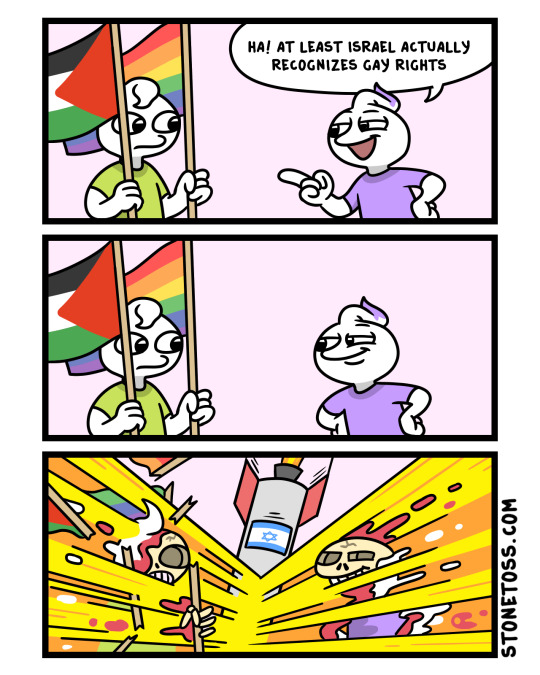
terrible art aside, this comic is making a point that i usually see in left wing circles: that israel is pinkwashing genocide.
curious if there was more like this, i kept looking, and the comic right before that one was this:

again, this makes points that i usually see in left wing circles. that american healthcare is crazy expensive, that canada tells poor people to commit suicide, and that israel is bombing hospitals.
why does stonetoss, this well known alt-right nutjob, now seem to be bringing up left-wing talking points?
curious, i kept going deeper:

well this is... odd. clearly, stonetoss is trying to say that israel is on another level of bad, even worse than russia, iran, and north korea. i can possibly see someone on the left making the argument that the russian invasion of ukraine isn't as bad as what israel is doing in gaza, or that at least north korea isn't invading any other countries, but... iran??? the country that has a police force designed to enforce religious law, and gets away with murdering women who do not properly cover their hair? the country that props up paramilitary groups in countries all over the middle east, including lebanon, yemen, and yes, palestine?? that's completely ridiculous
but, given how much more israel is in the news nowadays than any of these other countries, i could see why someone would buy this
and now, we're starting to get to the crux of what stonetoss is trying to do. when someone sees this, they might be inclined to agree with it. they might begin to think that israel is the worst country on the planet
and that might not seem so bad at first. but the more you hate israel, especially irrationally, the more you feel allowed to dehumanize those who support it. the more you might be willing to agree with this comic, which came out two days prior to the one above
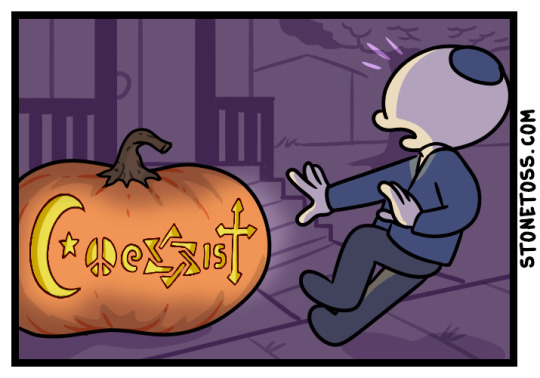
this comic says that jews, as a whole have no desire to exist with other people. it is blatantly antisemitic
i'm sure you could imagine some young leftist who sees the comics above this one and thinks, "this guy makes some good points". and then, when they get to this one, they might realize that this is antisemitism
or, they may not.
and that would start them down the road to becoming an antisemite.
this is what stonetoss and other alt-right nutjobs are hoping to achieve. to take left wing fury at israel, and direct it at jews.
we saw it with those neo-nazis at the palestine rally, and we're seeing it again here.
and if you've found yourself agreeing with what stonetoss has said so far, i would like you to see the last comic stonetoss put out before october 7th:
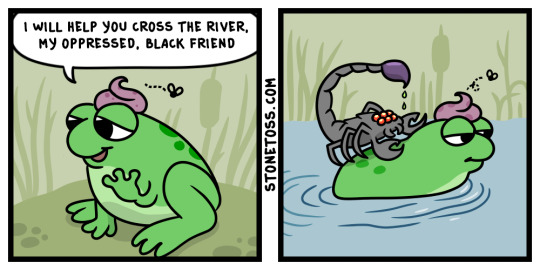
this horrifically racist comic is in reference to an environmental activist who was murdered by a black man in early october. this blatantly racist garbage is the kind of stuff stonetoss usually puts out.
but as soon as october 7th happened? these were his next two comics:
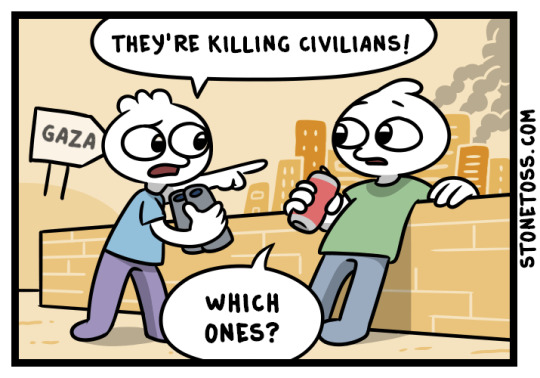
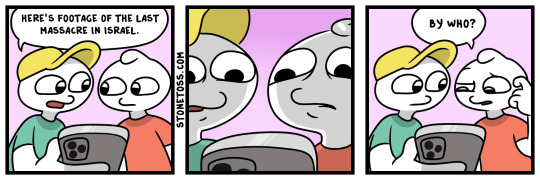
stonetoss completely changed the comic's tone as soon as the current crisis started. why?
to get as many people as possible to get on board with hating jews.
and i know many of you might be thinking that "well, everyone knows that stonetoss is racist garbage. nobody is going to fall for this"
except, as we saw with the neo-nazis at the rally for palestine, it's not always that obvious who the antisemites are and who is just rallying for peace. they are often a lot better at disguising it than stonetoss is.
AND EVERYONE NEEDS TO BE AWARE OF THAT
EVERYONE, no matter HOW much experience you have, can fall victim to propoganda. EVERYONE needs to be aware of what people around them are saying, and able to pick out hateful rhetoric, because even the stuff that is just kind of toeing the line of what's hateful is still putting your foot in the door
be cautious, everyone. and stomp out hate where you see it.
10K notes
·
View notes
Text
If you don't vote for Biden the gays will be rounded up in Project2025! No more abortion! No more anything!
Vote Biden!!
You mean this Biden?

U.S. will never allow Iran to acquire a nuclear weapon, Biden tells Israel's Lapid

US to launch West Asia Quad with India, Israel and UAE during Biden's visit
.....The same joe Biden that's ALREADY completing goals outlined in Project 2025?
And these are only links and evidence for one page.
Vote 3rd party or don't vote at all, I'm not your dad, do what feels right to you.
But don't vote blue and tell everyone it's a vote against Project2025 or Trump or fascism or that you're saving democracy with your vote. Because you're not. It's literally just gaslighting or at the very least an ignorant and uninformed stance.
You might as well be burning your ballot or voting for Trump.
Quit guilting everyone for not wanting to vote blue when him supporting apartheid & genocide is a good enough reason not to, let alone all of this, too.
And if you're gonna vote for him anyway, get used to being called a white supremacist who supports fascists. Because that's what you would be.
#vote#biden#trump#jasmine sherman#2024 elections#2024#fact check#vote blue#biden 2024#voting#electoral politics#usa#equality#social justice#human rights#queer#lgbt#iran#palestine#israel#saudi arabia#türkiye#nato#russia#china#liberals#democrats#democracy#us politics#liberation
328 notes
·
View notes
Text
russia be like: we did it → Ukraine did it → it happened by itself.
and the world swallows it.
every time someone, sitting thousands of km from Ukraine, in safety and comfort, starts spreading theories in which "not everything is so clear-cut" and "it is not known who is guilty and who is lying", I lose faith in humanity.
nine years ago, russia said that it was not russian troops that invaded Ukraine. today the whole world knows that it was the russians, and the russians do not even deny it anymore.
last year, russia said that it would not launch a full-scale invasion, but we can all see that russia lied. again.
russia justified the invasion by "denazification of Ukrainians", although it is the russians who are known for the phrase "we can repeat" addressing to the Germans in relation to World War II. it is the russians who created the cult of the leader, spread their Z V swastika all over the world and promote the greatness of war.
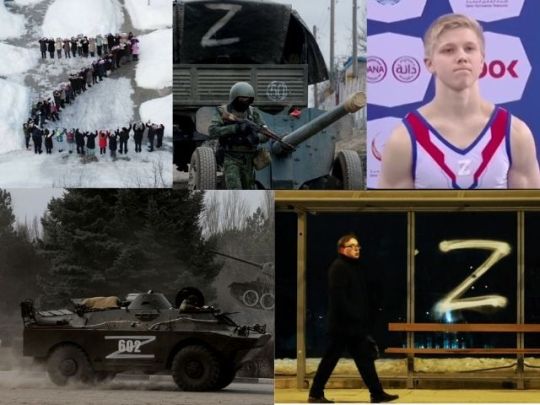
russia justified the invasion as a "preemptive strike" so that Ukraine would not join NATO and NATO would not attack russia. although there were already NATO member countries on the border with russia. another cheap lie.
russia justified the invasion by the fact that in Ukraine "the russian-speaking population is oppressed". although even our president spoke russian before the invasion.
meanwhile, russian state channels simply say that Ukrainians annoy them, so Ukrainians must be destroyed.
russia said that it would not shell civilians, but russia began the invasion by shelling houses in the middle of the night and dropping bombs on sleeping civilians. on all of us.
russia said that its targets are only military facilities, but russia destroys entire cities and villages along with the population, killing Ukrainians every day.

since the beginning of the war, only Ukrainians have suffered. russians forcibly take Ukrainian children to the territory of russia, where the children are subjected to physical and psychological violence. with hard efforts, Ukraine managed to return a few, but currently about 30,000 Ukrainian children (only those who could be counted) are still in russia.
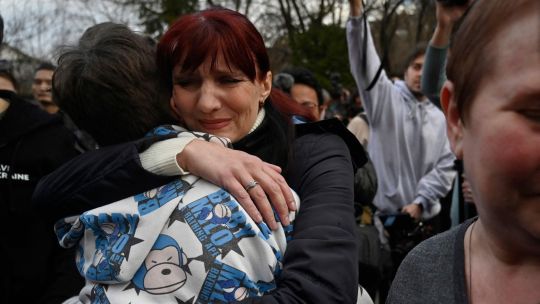

first the russians drowned the Ukrainians, and then they began a massive shelling of the flooded cities in order to kill those who survived and those who came to the rescue.

this is a full-scale invasion of russia on the territory of Ukraine. Ukrainians are dying. Ukraine's ecology is suffering. the russians openly declare that all of Ukraine must be destroyed. they talk about it every day on state channels, their politicians call for the extermination of Ukrainians.


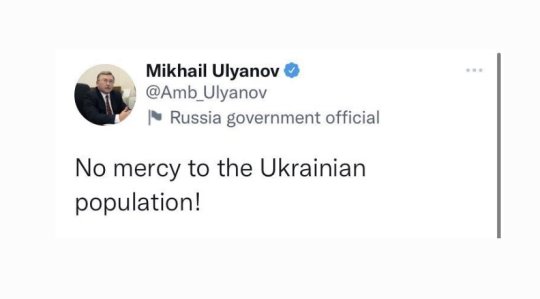
russians set up torture chambers for Ukrainians, execute Ukrainians, cut off the heads, hands and legs of our people, rape children, film all of this and show off. the whole Tumblr would not be enough to list all the tragedies that russia has caused and for which we cry every day, commemorate the victims every day, mourn every day.
now the russians blew up the dam and flooded dozens of Ukrainian towns and villages. these are terrible consequences for Ukraine first of all. then for the world and environment. but not for russia.

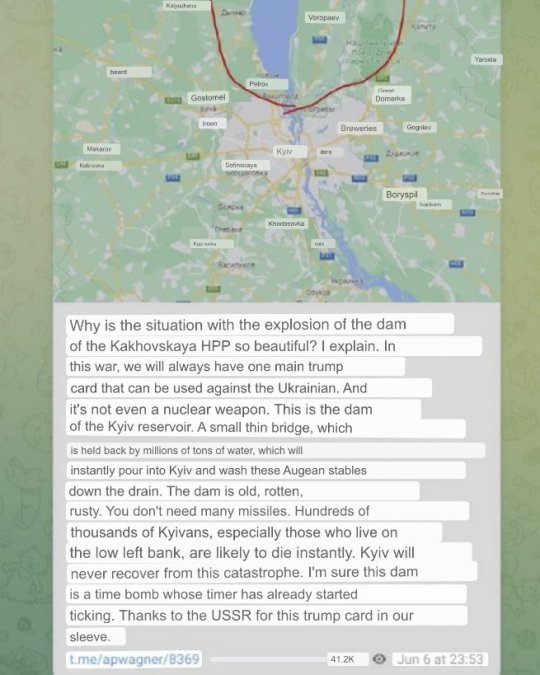
and while the Ukrainians were left alone with another russian war crime, with a crime against humanity, against the environment, russia simply says "it's not us" and people still believe it, and russia gets away with a tragic crime again.
please be sensible, russia has been at war with all its neighbors, russia is still at war in Syria, russia has been shelling Syrians even when there was an earthquake! now that russia caused the flood in Ukraine, russians are shelling Ukrainians, trying to finish off the wounded and those who did not manage to evacuate.
russia is evil and russia always lies. these are long proven facts, and if you have never delved into the topic of russian wars before, listen to the victims, listen to those whose lives russia is trying to take away.
everything is very simple right now — take the side of Ukraine. of Syria. support good.
#long post#russia is a terrorist state#stand with ukraine#russia invades ukraine#russian war crimes#russian war in ukraine#war in ukraine#support ukraine#help ukraine#ukraine#stop russia#fuck russia#fuck putin#boost#catastrophe#syria#russian war in syria#russia#2023#signal boost
368 notes
·
View notes
Note
This may be a stupid question but do you really believe MTG is funded by Putin? In my head she's too fucking stupid to be calculating enough to actually enrich herself.
I don't know if she is actually getting money from the Kremlin or she's just a moron who loves to believe whatever conspiracy theorist nonsense she's told, but I think it's pretty clear she is either being handled fairly directly by Russian intelligence or is closely plugged into sophisticated Russian propaganda systems. Example A, Marge submitting an amendment to the Ukrainian aid bill insisting that aid not be disbursed until the Ukrainian government allegedly stopped "oppressing Hungarians in Transcarpathia." This is a key part of the Orban regime's anti-Ukraine talking points that has in turn been directly amplified by Russia, but it is so specific and so obscure (not to mention, there's literally zero chance Marge knows what any of those words or issues mean, or could find Transcarpathia on a map) that there's no way she organically came up with it on her own. She's also been otherwise echoing word-for-word Russian propaganda about them being "the defenders of Christianity" by invading Ukraine, which is one of Putin's preferred/favorite narratives and plays into the function of the Russian Orthodox Church as a Kremlin booster. Hence, if Marge is directly repeating Putin's personal justifications, I'd say it is more likely than not that she's getting something out of it.
As I have said before, it is pretty clear that Putin is ordering Trump to get the House GOP to stall Ukraine aid in exchange for help in the election, and there is a significant chunk of the House GOP that is eager to suckle at the Russian propaganda teat in all circumstances. (See: Hunter Biden's laptop being a Russian disinformation operation from the start that got exposed when the House GOP impeachment effort went up in flames.) We have also consistently had networks of Russian agents and Russian money be exposed in Europe, where they are offering financial incentives to EU politicians to serve as Kremlin shills. Russian dirty money has beyond doubt entered the Republican Party at many, many levels; we had that whole investigation about how Trump and the Russians have been working in concert for a long time. Now, because getting Trump in power again is so important for the Russians, and the Russians' help is so important for Trump in trying to stay out of jail, the corruption is pretty systemic.
In short, I figure it is only a matter of time if/when we find out that the most stridently pro-Russian members of the Treason Caucus are actually being paid by or otherwise benefiting from Russian lobbyists, because they are fascist traitors who love money, will kiss Trump's ass in any circumstances, and are willing to do anything in the name of undermining America, Ukraine, Biden, and Western democracy in general. We know it is the way Russian destabilization, disinformation, and influence operations customarily work, and that they have previously and consistently worked in cahoots with MAGA, so yeah. If Marge and Co. aren't active Russian assets, financially or otherwise, I would be very surprised.
67 notes
·
View notes
Text
“I sometimes hear people say that Russia was forced to attack Ukraine because Ukrainians wanted to join NATO. Those people also often say that NATO promised it would not expand to the East, but later broke this promise. And this, allegedly, is the reason why Russia keeps attacking its neighbors.
If you have ever heard people say something like that, please know that this is not true. And it will take me less than five minutes to prove with facts that both statements are false.
First, let's have a look at the timeline of events.
Russia first invaded Ukraine in February 2014 by occupying the Crimea peninsula. At that moment, Ukraine was a neutral country by law and expressed no intention of joining NATO whatsoever. For instance, during the Revolution of Dignity, the protesters insisted on Ukraine joining the EU, not NATO. It was only in autumn 2014, after many months of war, that Ukraine abandoned neutrality.
So what came first? Russia attacking Ukraine, or Ukraine wanting to join NATO?
The answer is clear.
Had Russia not threatened Ukraine's existence, there would be no reason for our country to seek collective security. So please do not repeat the lie that, I quote, “Russia attacked because Ukraine wanted to join NATO,” end of quote. This does not correspond with the facts.
Now let's have a look at the story of NATO allegedly promising not to expand to the East.
If you ask people who say this, when exactly, such a promise was made and who made it, most of them will not be able to provide a clear answer. Spoiler, because no such promise has ever been made and the whole story is a Russian fairy tale.
Those more sophisticated will tell you that the promise was made to the President of the USSR, Mikhail Gorbachev. They may even refer to the 1990 U.S.-Soviet negotiations on the reunification of Germany. Again, let’s consider the timeline.
In summer 1990, when these talks were held, the Soviet analog of NATO, the Warsaw Pact, still existed. Its dissolution, let alone the Soviet Union's dissolution, was not on the cart. No one even talked about it or imagined it. It was only next year, in 1991 that the Warsaw Pact, and later the USSR, quite unexpectedly ceased to exist.
Now explain to me just how the very issue could be even discussed in the summer of 1990. It is not surprising that Mikhail Gorbachev later himself refuted this falsehood. When asked by a journalist whether any such promise had been made, he said this was a myth.
Now let's look at it from another perspective. How could NATO even promise anything like that?
Initially, it is not NATO that decides which country joins it. Countries themselves need to want it. And actually, the membership criteria are very difficult. It requires a lot of political will and reform. All the NATO members that joined it after 1991, really wanted to be part of it.
Their people wanted this.
And here comes the most uncomfortable question for Russia: Why were all of the nations that had been part of the Soviet Union or the Socialist bloc so eager and desperate to join NATO?
Well, maybe because in three decades, Russia has invaded or incited war in at least three of its neighbors, Moldova, Georgia and Ukraine. At the same time, Russia has not dared to invade any of its NATO neighbors.
Do you see the pattern?
The only reason for countries in the vicinity of Russia to seek NATO membership has always been and remains the need to protect their people from Russia.
Therefore, Moscow has only itself to blame for the fact that all of the central European and Baltic nations ran away from it and hid under the NATO umbrella as quickly as they could.
Do not let Russian officials or their supporters in the West fool you. Russia attacked Ukraine not because NATO expanded to the East, or because Ukraine wanted to join NATO. Russia attacked because it denies Ukraine's right to exist and wants to conquer our land and kill our people. It is through our shared strength that we can and must stop Russia and put an end to its aggressive plans for the rest of Europe.
For this to happen, keep supporting Ukraine and don't buy Russian lies.”
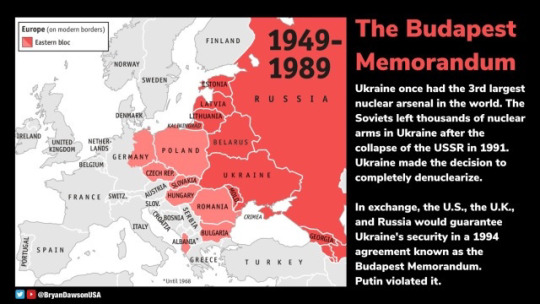
👉🏿 https://www.brookings.edu/blog/up-front/2014/11/06/did-nato-promise-not-to-enlarge-gorbachev-says-no/
👉🏿 https://www.tumblr.com/odinsblog/686191406300184576/appeasement-does-not-work-appeasement-didnt
👉🏿 https://www.tumblr.com/odinsblog/684530801484922880/believing-putins-reasons-for-invading-ukraine
👉🏿 https://www.tumblr.com/odinsblog/742088177664344064/violated-agreements-1991-russia-cosigns
#politics#ukraine#russia#dmytro kuleba#russian propaganda#nato#russian colonialism#nato expansion#russian imperialism#mikhail gorbachev#russia is a terrorist state#warsaw pact#russian expansion#russian fascism ☭#soviet union#tankies#vladimir putin is a war criminal#baltic states#🇺🇦
83 notes
·
View notes
Text
Geopolitics is not what you think.
It is interesting to me that how we view issues of global politics and how academics and certain political actors view the issues have such a huge separation.
For instance, when people view the russian invasion of ukraine, they think of a simple power grab, or they don't understand why russia would want to do that.
When i was talking to a friend, who is a geopolitical expert, about the russian war against ukraine, he pulled out a topographical map of europe. Geopolitics is the study of how geography affects politics. it is NOT a general term for international politics.

The easy answer is Russia's need for a warm water port. If you know russia's borders, you would know that all of it's major ports are in the north and they freeze in the winter. They don't have a good port in the black sea that stays unfrozen. Sevastopol is the port in Crimea. While technically Ukrainian territory, it has been controlled by Russia since 2014.
The second point he made was looking at the moutains. See the map above. Then let's look at a map of the warsaw pact

Understanding moutain ranges and how they are defensible, you start to see why NATO and the Warsaw pact involved those specific countries. it creates a natural bottle neck in Germany. This also goes into why Poland gets invaded so much. it is a flat territory without natural boundaries that makes it easy to attack, and if you want your border to be a mountain you have to go through Poland. Without the countries to make up its borders anymore, Russia lacks natural boundaries. Instead of the carpathian mountains, they have simple grassland.
Then you talk to demographers as to why russia is aggressive, you see that since the end of the cold war, russia's death rate has exceeded it's birth rate. this causes a decline in population and a "demographic crisis." the average age in russia is over 40 years old. this stagnation has rippling effects throughout the country. with an older workforce, they don't have a surplus younger generation to pay for the care of the older generation. they are experiencing migration out of the country of individuals with experience and education needed in the country. They are, in short, a nation in panic.
In the international relations field, you see discussions of the lack of political influence. Russia once held a spot as one of two superpowers in the world. a regional giant who's influence shook the way international politics operated. From 1950-1989 there were really only two countries in the world that everyone needed to pay attention to: the Soviet Union and the United States. everyone else was a pawn. There was the First world, the US and her allies, the Second World, the Soviet Union and her allies, and the Third world, the non-aligned nations. (which, by the way, is where that phrase came from. a "third world" country was thought as a country so unimportant, neither the US or USSR cared about you.) in this climate, Russian, who still held what was considered the second most powerful military in the world (though... not so much now) felt they were under appreciated. China was the emerging economic powerhouse.
This is something i went into in my IR video. (as i have an IR background)
youtube
What is amazing about all this analysis is that different fields point to different reasons as to why russia invaded. and similar analysis could be done other regions. any conflict can be analyzed in this manner. the disputes in africa are interesting because the easy answer to why there are so many wars in africa is "colonialism." and i think it does make a useful, simplified solution. but it foregoes the other realms of analysis as to why these conflicts are happening.
not sure what made me procrastinate on making a video and writing this out. i needed a break from editing. I hope you found this interesting.
122 notes
·
View notes
Text
all kinds of trigger warnings
I'm not okay.
Last night, as I was trying to fall asleep, the thought of my hometown crossed my mind for a split second, a mere moment, and I teared up. It wasn't even a complete thought, just a blurry image. I didn't cry, only a couple tears that I quickly wiped away, but it's strange. It's not a good town, never was, even back then, but now it's ten times worse obviously. It's theirs now, I will most likely never see it again, not that there's anything to see there.
I'm not allowed to be sick of the war, as I'm not the one fighting in the trenches. So I'm sick of life instead, as I am indeed alive and have been for some time. I can't take any more losses. I know there are people who lost so much more than I did, yet they keep on going. But I genuenly can't lose anymore. And it makes everything too precious. When your entire world shrinks, fits into one person sleeping next to you, in one place with a leaking roof and creaky floor, in one moment of stillness. I can't bare the thought of losing it. I can't live in this all-consuming fear of losing it all any longer. And I know I'm going to lose.
I had exactly one happy year in my life. Well, it's only happy in retrospective. When I was 17-18, moved away from my absolutely horrible family, met my future husband and moved in with him. We were very poor, we fought all the time in those early years, and that was the year my bipolar disorder manifested in full strenght. The same age as my father's. But I was studying in the uni I loved, I wasn't bullied at school for the first time in my life, I had good grades and was making friends.
Then 2014 came. Russians came to my city in tanks, their favorite vehicle when visiting Ukraine. It was a scary year of artillery, empty streets and store shelves, duct tape on window panes, queues for humanitarian aid food packages, sandwiches with catfood-like pate from said food packages for breakfast, lunch and dinner.
Russians of course took over my uni along with everything else. And every night falling asleep to the sounds of their tanks and APCs (they moved them at night), I dreamed that these were Ukrainian tanks coming to free us. But it never was.
And despite it getting better on a surface level, it only gets worse. We're not so poor anymore, we don't fight with my husband, I accepted my mental illness and sort of made peace with it. And I was almost the happiest person on Earth for a couple of months when I moved from Donetsk, and Russia hadn't invaded us yet. I had future ahead of me, I made plans, I thought my life had just begun after all.
I can't keep losing and I can't keep making it worse. In my teenage years I dealt with having a terrible family by finding even more terrible and abusive person and clinging to him for over ten years. I got so hurt by my closest friend that I never made a single close friend again. I found my husband and now can't even kill myself because I can't do that to him. Now I have something - someone - to lose. I should've end it way back when I had nothing and no one. I can't live with this fear, it's unbearable. I want it to end. I want to either wake up and realize that this war was just a nightmare, or not wake up at all.
please donate to the Ukrainian army using one of the links in my pinned post. just please, even a single penny, just do this
69 notes
·
View notes
Text
Guayana Esequiba and Why It Matters
So, I do not usually make statements like these considering my blog is mainly fandom but I felt like I need to.
If you do not know, I am Guyanese of African descent. My parents are Guyanese immigrants, born shortly after the country gained independence. Most of my family came from Guyana. I am very proud of being Guyanese and I can say that it is a part of who I am.
Before I go further, whenever I say Venezuela, I am primarily talking about the Venezuelan government and Nicolas Maduro, NOT the Venezuelan people who had to suffer this. Just saying this before anyone accuses me of being a racist.
Now, if you have been looking at the news, you saw that Venezuela had a referendum to annex the Esequibo region, which is a region that is west of the Esequibo River in Guyana. That region takes up at least two-thirds of Guyana. This region has been disputed since the colonial era, mainly between Spain and the British Empire. This continued when Venezuela and Guyana gained their independence. In the present, Guyana has been having rapid economic growth since it discovered oil as Venezuela went downhill since Maduro got power. The latter had been suffering from hyperinflation, high poverty levels, and food shortages. So much so that some of them had to leave for Guyana from the west. This led to tensions between them and the Guyanese and that's putting it lightly.
As Guyana discovered oil on their territorial water, Venezuela wanted it. So they decided to seize it by stating that the Esequibo region belonged to them, despite it being clear that it belonged to Guyana. ExxonMobil already made deals with Guyana to get the oil. I know how people will say that ExxonMobil is greedy, which I do not disagree with, but be aware that GUYANA is the one who has the right to those waters and made a deal with them. Plus, people should not make the argument that Guyana should have a meeting with Venezuela about THEIR OWN SOVEREIGN TERRITORY. It does not make sense because the Esequibo Region has been established to be a part of Guyana since its creation. This is the same logic where people believe that Ukraine should be in talks with Russia about the territory that the latter STOLE with invasions and rigged elections.
Not to mention that the Guyanese government was in talks for years to resolve this diplomatically.
There is no legitimate reason to further invade or annex a country. It was bad when the US took over Iraq. It was bad when Russia took over Crimea and Ukraine's eastern regions. Now, it is bad that Venezuela is planning to annex about 66% of Guyana.
Do you think that they would stop there? I doubt the rest of South America believes that.
The People of Guyana are not giving up one blade of grass. Spread the word.

75 notes
·
View notes
Text
"Americans and Europeans were guided through the new century by a tale about “the end of history,” by what I will call the politics of inevitability, a sense that the future is just more of the present, that the laws of progress are known, that there are no alternatives, and therefore nothing really to be done. In the American capitalist version of this story, nature brought the market, which brought democracy, which brought happiness. In the European version, history brought the nation, which learned from war that peace was good, and hence chose integration and prosperity.
Before the collapse of the Soviet Union in 1991, communism had its own politics of inevitability: nature permits technology; technology brings social change; social change causes revolution; revolution enacts utopia. When this turned out not to be true, the European and American politicians of inevitability were triumphant. Europeans busied themselves completing the creation of the European Union in 1992. Americans reasoned that the failure of communist story confirmed the truth of the capitalist one. Americans and Europeans kept telling themselves their tales of inevitability for a quarter century after the end of communism, and so raised a millennial generation without history. (..)
The collapse of the politics of inevitability ushers in another experience of time: the politics of eternity. Whereas inevitability promises a better future for everyone, eternity places one nation at the center of cyclical story of victimhood. Time is no longer a line into the future, but a circle that endlessly returns the same threats from the past. Within inevitability, no one is responsible because we all know that the details will sort themselves out for the better; within eternity, no one is responsible because we all know that the enemy is coming no matter what we do. Eternity politicians spread the conviction that the government cannot aid society as a whole but can only guard against threats. Progress gives way to doom. (..)
This book is an attempt to win back the present for historical time, and thus to win back historical time for politics. This means trying to understand one set of interconnected events in our own contemporary world history, from Russia to the United States, at a time when factuality itself was put into question. Russia’s invasion of Ukraine in 2014 was a reality test for the European Union and the United States. Many Europeans and Americans found it easier to follow Russia’s propaganda phantoms than to defend a legal order. Europeans and Americans wasted time by asking whether an invasion had taken place, whether Ukraine was a country, and whether it had somehow deserved to be invaded. This revealed a capacious vulnerability that Russia soon exploited within the European Union and the United States. (..)
What has already happened in Russia is what might happen in America and Europe: the stabilization of massive inequality, the displacement of policy by propaganda, the shift from the politics of inevitability to the politics of eternity. Russian leaders could invite Europeans and Americans to eternity because Russia got there first. They understood American and European weaknesses, which they had first seen and exploited at home.
For many Europeans and Americans, events in the 2010s – the rise of antidemocratic politics, the Russian turn against Europe and invasion of Ukraine, the Brexit referendum, the Trump election – came as a surprise. Americans tend to react to surprise in two ways: either by imagining that the unexpected event is not really happening, or by claiming that it is totally new and hence not amenable to historical understanding. Either all will somehow be well, or all is so ill that nothing can be done. The first response is a defense mechanism of the politics of inevitability. The second is the creaking sound that inevitability makes just before it breaks and gives way to eternity. The politics of inevitability first erodes civic responsibility, and then collapses into the politics of eternity when it meets a serious challenge. Americans reacted in these ways when Russia’s candidate became president of the United States. (..)
Concepts and practices moved from east to west. An example is the word “fake”, as in “fake news”. This sounds like an American invention, and Donald Trump claimed it as his own; but the term was used in Russia and Ukraine long before it began its career in the United States. It meant creating a fictional text that posed as a piece of journalism, both to spread confusion about a particular event and to discredit journalism as such. Eternity politicians first spread fake news themselves, then claim that all news is fake, and finally that only their spectacles are real. The Russian campaign to fill the international public sphere with fiction began in Ukraine in 2014, and then spread to the United States in 2015, where it helped to elect a president in 2016. The techniques were everywhere the same, although they grew more sophisticated over time.
Russia in the 2010s was a kleptocratic regime that sought to export the politics of eternity: to demolish factuality, to preserve inequality, and to accelerate similar tendencies in Europe and the United States. This is well seen from Ukraine, where Russia fought a regular war while it amplified campaigns to undo the European Union and the United States. The advisor of the first pro-Russian American presidential candidate had been the advisor of the last pro-Russian Ukrainian president. Russian tactics that failed in Ukraine succeeded in the United States. Russian and Ukrainian oligarchs hid their money in a way that sustained the career of an American presidential candidate. This is all one history, the history of our moment and our choices."
Timothy Snyder, The Road To Unfreedom: Russia, Europe, America
30 notes
·
View notes
Text
The Untold History of Cabaret: Revived and Kicking
As Broadway welcomes the ever-evolving musical, its star, Eddie Redmayne—along with Liza Minnelli, Joel Grey, and Sam Mendes—assess its enduring power.
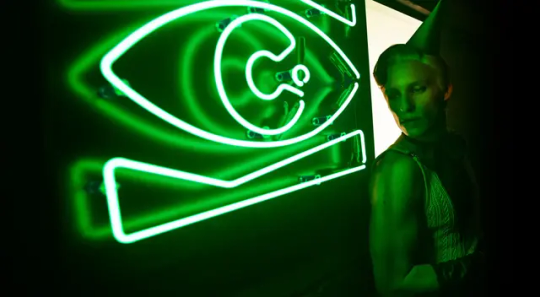
As director Rebecca Frecknall was rehearsing a new cast for her hit London revival of Cabaret, the actor playing Clifford Bradshaw, an American writer living in Berlin during the final days of the Weimar Republic, came onstage carrying that day’s newspaper as a prop. It happened to be Metro, the free London tabloid commuters read on their way to work. The date was February 25, 2022. When the actor said his line—“We’ve got to leave Berlin—as soon as possible. Tomorrow!”—Frecknall was caught short. She noticed the paper’s headline: “Russia Invades Ukraine.”
Cabaret, the groundbreaking 1966 Broadway musical that tackles fascism, antisemitism, abortion, World War II, and the events leading up to the Holocaust, had certainly captured the times once again.
Back in rehearsals four months later, Frecknall and the cast got word that the Supreme Court had overturned Roe v. Wade. Every time she checks up on Cabaret, “it feels like something else has happened in the world,” she told me over coffee in London in September.
A month later, as Frecknall was preparing her production of Cabaret for its Broadway premiere, something else did happen: On October 7, Hamas terrorists infiltrated Israel, killing at least 1,200 people and taking more than 240 hostages.
The revival of Cabaret—starring Eddie Redmayne as the creepy yet seductive Emcee; Gayle Rankin as the gin-swilling nightclub singer Sally Bowles; and Bebe Neuwirth as Fraulein Schneider, a landlady struggling to scrape by—opens April 21 at Manhattan’s August Wilson Theatre. It will do so in the shadow of a pogrom not seen since the Einsatzgruppen slaughtered thousands of Jews in Eastern Europe and in the shadow of a war between Israel and Hamas that continues into its fifth month, with the killing of thousands of civilians in Gaza.
Nearly 60 years after its debut, Cabaret still stings. That is its brilliance. And its tragedy.
Redmayne has been haunted by Cabaret ever since he played the Emcee in prep school. “I was staggered by the character,” he says. “The lack of definition of it, the enigma of it.” He played the part again during his first year at Cambridge at the Edinburgh Fringe Festival, where nearly 3,500 shoestring productions jostle for attention each summer. Cabaret, performed in a tiny venue that “stank,” Redmayne recalls, did well enough that the producers added an extra show. He was leering at the Kit Kat Club girls from 8 p.m. till 10 p.m. and then from 11 p.m. till two in the morning. “You’d wake up at midday. You barely see sunshine. I just became this gaunt, skeletal figure.” His parents came to see him and said, “You need vitamin D!”
In 2021, Redmayne, by then an Oscar winner for The Theory of Everything and a Tony winner for Red, was playing the Emcee again, this time in Frecknall’s West End production. His dressing room on opening night was full of flowers. There was one bouquet with a card he did not have a chance to open until intermission. It was from Joel Grey, who originated the role on Broadway and won an Oscar for his performance alongside Liza Minnelli in the 1972 movie. He welcomed the young actor “to the family,” Redmayne says. “It was an extraordinary moment for me.”
Cabaret is based on Goodbye to Berlin, the British writer Christopher Isherwood’s collection of stories and character studies set in Weimar Germany as the Nazis are clawing their way to power. Isherwood, who went to Berlin for one reason—“boys,” he wrote in his memoir Christopher and His Kind—lived in a dingy boarding house amid an array of sleazy lodgers who inspired his characters. But aside from a fleeting mention of a host at a seedy nightclub, there is no emcee in his vignettes. Nor is there an emcee in I Am a Camera, John Van Druten’s hit 1951 Broadway play adapted from Isherwood’s story “Sally Bowles” from Goodbye to Berlin.
The character, one of the most famous in Broadway history, was created by Harold Prince, who produced and directed the original Cabaret. “People write about Cabaret all the time,” says John Kander, who composed the show’s music and is, at 96, the last living member of that creative team. “They write about Liza. They write about Joel, and sometimes about us [Kander and lyricist Fred Ebb]. None of that really matters. It’s all Hal. Everything about this piece, even the variations that happen in different versions of it, is all because of Hal.”
In 1964, Prince produced his biggest hit: Fiddler on the Roof. In the final scene, Tevye and his family, having survived a pogrom, leave for America. There is sadness but also hope. And what of the Jews who did not leave? Cabaret would provide the tragic answer.
But Prince was after something else. Without hitting the audience over the head, he wanted to create a musical that echoed what was happening in America: young men being sent to their deaths in Vietnam; racists such as Alabama politician “Bull” Connor siccing attack dogs on civil rights marchers. In rehearsals, Prince put up Will Counts’s iconic photograph of a white student screaming at a Black student during the Little Rock crisis of 1957. “That’s our show,” he told the cast.
A bold idea he had early on was to juxtapose the lives of Isherwood’s lodgers with one of the tawdry nightclubs Isherwood had frequented. In 1951, while stationed as a soldier in Stuttgart, Germany, Prince himself had hung around such a place. Presiding over the third-rate acts was a master of ceremonies in white makeup and of indeterminate sexuality. He “unnerved me,” Prince once told me. “But I never forgot him.”
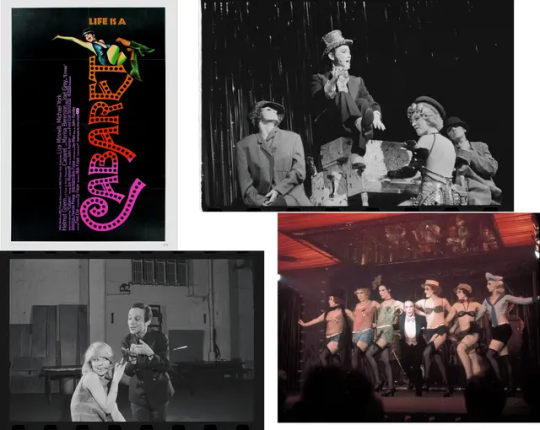
Kander had seen the same kind of character at the opening of a Marlene Dietrich concert in Europe. “An overpainted little man waddled out and said, ‘Willkommen, bienvenue, welcome,’ ” Kander recalls.
The first song Kander and Ebb wrote for the show was called “Willkommen.” They wrote 60 more songs. “Some of them were outrageous,” Kander says. “We wrote some antisemitic songs”—of which there were many in Weimar cabarets—“ ‘Good neighbor Cohen, loaned you a loan.’ We didn’t get very far with that one.”
They did write one song about antisemitism: “If You Could See Her (The Gorilla Song),” in which the Emcee dances with his lover, a gorilla in a pink tutu. At the end of the number, he turns to the audience and whispers: “If you could see her through my eyes, she wouldn’t look Jewishhh at all.” It was, they thought, the most powerful song in the score.
The working title of their musical was Welcome to Berlin. But then a woman who sold blocks of tickets to theater parties told Prince that her Jewish clients would not buy a show with “Berlin” in the title. Strolling along the beach one day, Joe Masteroff, who was writing the musical’s book, thought of two recent hits, Carnival and Camelot. Both started with a C and had three syllables. Why not call the show Cabaret?
To play the Emcee, Prince tapped his friend Joel Grey. A nightclub headliner, Grey could not break into Broadway. “The theater was very high-minded,” he once said. When Prince called him, he was playing a pirate in a third-rate musical in New York’s Jones Beach. “Hal knew I was dying,” Grey recounts over lunch in the West Village, where he lives. “I wanted to quit the business.”
At first, he struggled to create the Emcee, who did not interact with the other characters. He had numbers but “no words, no lines, no role,” Grey wrote in his memoir, Master of Ceremonies. A polished performer, he had no trouble with the songs, the dances, the antics. “But something was missing,” he says. Then he remembered a cheap comedian he’d once seen in St. Louis. The comic had told lecherous jokes, gay jokes, sexist jokes—anything to get a laugh. One day in rehearsal, Grey did everything the comedian had done “to get the audience crazy. I was all over the girls, squeezing their breasts, touching their bottoms. They were furious. I was horrible. When it was over I thought, This is the end of my career.” He disappeared backstage and cried. “And then from out of the darkness came Mr. Prince,” Grey says. “He put his hand on my shoulder and said, ‘Joely, that’s it.’ ”
Cabaret played its first performance at the Shubert Theatre in Boston in the fall of 1966. Grey stopped the show with the opening number, “Willkommen.” “The audience wouldn’t stop applauding,” Grey recalls. “I turned to the stage manager and said, ‘Should I get changed for the next scene?’ ”
The musical ran long—it was in three acts—but it got a prolonged standing ovation. As the curtain came down, Richard Seff, an agent who represented Kander and Ebb, ran into Ebb in the aisle. “It’s wonderful,” Seff said. “You’ll fix the obvious flaws.” In the middle of the night, Seff’s phone rang. It was Ebb. “You hated it!” the songwriter screamed. “You are of no help at all!”
Ebb was reeling because he’d learned Prince was going to cut the show down to two acts. Ebb collapsed in his hotel bed, Kander holding one hand, Grey the other. “You’re not dying, Fred,” Kander told him. “Hal has not wrecked our show.”
Cabaret came roaring into New York, fueled by tremendous word of mouth. But there was a problem. Some Jewish groups were furious about “If You Could See Her.” How could you equate a gorilla with a Jew? they wanted to know, missing the point entirely. They threatened to boycott the show. Prince, his eye on ticket sales, told Ebb to change the line “She wouldn’t look Jewish at all” to something less offensive: “She isn’t a meeskite at all,” using the Yiddish word for a homely person.
It is difficult to imagine the impact Cabaret had on audiences in 1966. World War II had ended only 21 years before. Many New York theatergoers had fled Europe or fought the Nazis. There were Holocaust survivors in the audience; there were people whose relatives had died in the gas chambers. Grey knew the show’s power. Some nights, dancing with the gorilla, he’d whisper “Jewish” instead of “meeskite.” The audience gasped.
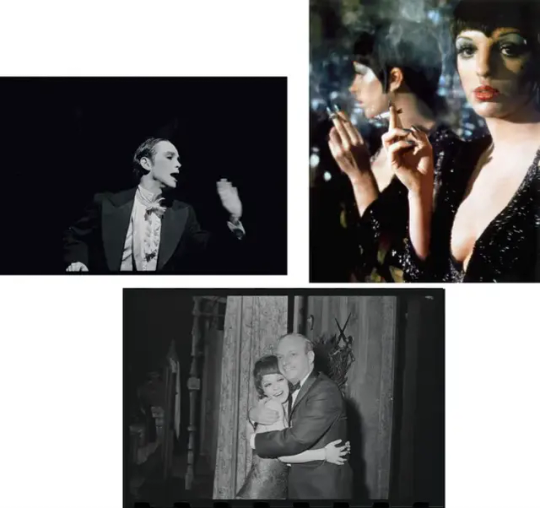
Cabaret won eight Tony Awards in 1967, catapulted Grey to Broadway stardom, and ran for three years. Seff sold the movie rights for $1.5 million, a record at the time. Prince, about to begin rehearsals for Stephen Sondheim’s Company, was unavailable to direct the movie, scheduled for a 1972 release. So the producers hired the director and choreographer Bob Fosse, who needed the job because his previous movie, Sweet Charity, had been a bust.
Fosse, who saw Prince as a rival, stamped out much of what Prince had done, including Joel Grey. He wanted Ruth Gordon to play the Emcee. But Grey was a sensation, and the studio wanted him. “It’s either me or Joel,” Fosse said. When the studio opted for Grey, Fosse backed down. But he resented Grey, and relations between them were icy.
A 26-year-old Liza Minnelli, on the way to stardom herself, was cast as Sally Bowles. The handsome Michael York would play the Cliff character, whose name in the movie was changed to Brian Roberts. And supermodel Marisa Berenson (who at the time seemed to be on the cover of Vogue every other month) got the role of a Jewish department store heiress, a character Fosse took from Isherwood’s short story “The Landauers.”
Cabaret was shot on location in Munich and Berlin. “The atmosphere was extremely heavy,” Berenson recalls. “There was the whole Nazi period, and I felt very much the Berlin Wall, that darkness, that fear, all that repression.” She adored Fosse, but he kept her off balance (she was playing a young woman traumatized by what was happening around her) by whispering “obscene things in my ear. He was shaking me up.”
Minnelli, costumed by Halston for the film, found Fosse “brilliant” and “incredibly intense,” she tells Vanity Fair in a rare interview. “He used every part of me, including my scoliosis. One of my great lessons in working with Fosse was never to think that whatever he was asking couldn’t be done. If he said do it, you had to figure out how to do it. You didn’t think about how much it hurt. You just made it happen.”
Back in New York, Fosse arranged a private screening of Cabaret for Kander and Ebb. When it was over, they said nothing. “We really hated it,” Kander admits. Then they went to the opening at the Ziegfeld Theatre in New York. The audience loved it. “We realized it was a masterpiece,” Kander says, laughing. “It just wasn’t our show.”
“PAPA WAS EVEN MORE EXCITED ABOUT THE OSCAR THAN I WAS,” SAYS LIZA MINNELLI. “AND, BABY, I WAS—NO, I AM STILL—EXCITED.”
The success of the movie—with its eight Academy Awards—soon overshadowed the musical. When people thought of Cabaret, they thought of finger snaps and bowler hats. They thought of Fosse and, of course, Minnelli, who would adopt the lyric “Life is a cabaret” as her signature. Her best-actress Oscar became part of a dynasty: Her mother, Judy Garland, and father, director Vincente Minnelli, each had one of their own. “Papa was even more excited about the Oscar than I was,” she says. “And, baby, I was—no, I am still—excited.”
By 1987—in part to burnish Cabaret’s theatrical legacy—Prince decided to recreate his original production on Broadway, with Grey once again serving as the Emcee. But it had the odor of mothballs. The New York Times drama critic Frank Rich wrote that it was not, as Sally Bowles sings, “perfectly marvelous,” but “it does approach the perfectly mediocre.” Much of the show, he added, was “old-fashioned and plodding.”
In the early 1990s, Sam Mendes, then a young director running a pocket-size theater in London called the Donmar Warehouse, heard the novelist Martin Amis give a talk. Amis was writing Time’s Arrow, about a German doctor who works in a concentration camp. “I’ve already written about the Nazis and people say to me, ‘Why are you doing it again?’ ” Amis said. “And I say, what else is there?”
At the end of the day,” Mendes tells me, “the biggest question of the 20th century is, ‘How could this have happened?’ ” Mendes decided to stage Cabaret at the Donmar in 1993. Another horror was unfolding at the time: Serb paramilitaries were slaughtering Bosnian Muslims, “ethnic cleansing” on an unimaginable scale.
Mendes hit on a terrific concept for his production: He transformed his theater into a nightclub. The audience sat at little tables with red lamps. And the performers were truly seedy. He told the actors playing the Kit Kat Club girls not to shave their armpits or their legs. “Unshaved armpits—it sent shock waves around the theater,” he recalls. Since there was no room—or money—for an orchestra, the actors played the instruments. Some of them could hit the right notes.
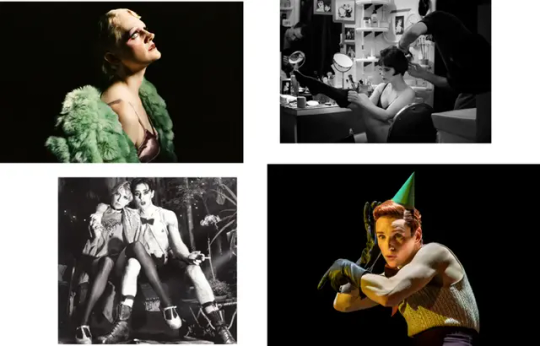
To play the Emcee, Mendes cast Alan Cumming, a young Scottish actor whose comedy act Mendes had enjoyed. “Can you sing?” Mendes asked him. “Yeah,” Cumming said. Mendes threw ideas at him and “he was open to everything.” Just before the first preview, Mendes suggested he come out during the intermission and chat up the audience, maybe dance with a woman. Mendes, frantic before the preview, never got around to giving Cumming any more direction than that. No matter. Cumming sauntered onstage as people were settling back at their tables, picked a man out of the crowd, and started dancing with him. “Watch your hands,” he said. “I lead.”
Cumming’s Emcee was impish, fun, gleefully licentious. The audience loved him. “I have never had less to do with a great performance in one of my shows than I had to do with Alan,” Mendes says.
When Joe Masteroff came to see the show in London, Mendes was nervous. He’d taken plenty of liberties with the script. Cliff, the narrator, was now openly gay. (One night, when Cliff kissed a male lover, a man in the audience shouted, “Rubbish!”) And he made the Emcee a victim of the Nazis. In the final scene, Cumming, in a concentration camp uniform affixed with a yellow Star of David and a pink triangle, is jolted, as if he’s thrown himself onto the electrified fence at Birkenau.
“I should be really pissed with you,” Masteroff told Mendes after the show. “But it works.” Kander liked it too, though he was not happy that the actors didn’t play his score all that well. Ebb hated it. “He wanted more professionalism,” Mendes says. “And he was not wrong. There was a dangerous edge of amateurishness about it.”
The Roundabout Theatre Company brought Cabaret to New York in 1998. Rob Marshall, who would go on to direct the movie Chicago, helped Mendes give the show some Broadway gloss while retaining its grittiness. The two young directors were “challenging each other, pushing each other,” Marshall remembers, “to create something unique.”
Cumming reprised his role as the Emcee. He was on fire. Natasha Richardson, the daughter of Vanessa Redgrave and director Tony Richardson, played Sally Bowles. She was not on fire. She’d never been in a musical before, and when she sang, “There was absolutely no sound coming out,” Kander says.
“She beat herself up about her singing all the time,” Mendes adds. “There was a deep, self-critical aspect of Tash that was instilled by her dad, a brilliant man but extremely cutting.” He once said to her out of nowhere: “We’re going to have to do something about your chin, dear.” As Mendes saw it, she always felt that she could never measure up to her parents.
Kander went to work with her, and slowly a voice emerged. It was not a “polished sound,” Marshall says, but it was haunting, vulnerable. Still, Cumming was walking away with the show. At the first preview, when he took his bow, the audience roared. When Richardson took hers, they were polite. Mendes remembers going backstage and finding her “in tears.” But she persevered and through sheer force of will created a Sally Bowles that “will break your heart,” Masteroff told me the day before I saw that production in the spring of 1998. She did indeed. (Eleven years later, while learning how to ski on a bunny hill on Mont Tremblant, she fell down. She died of a head injury two days later.)
The revival of Cabaret won four Tony Awards, including one for Richardson as best actress in a musical. It ran nearly 2,400 performances at the Roundabout’s Studio 54 and was revived again in 2014. And the money, money, money, as the song goes, poured in. Once Masteroff, having already filed his taxes at the end of a lucrative Cabaret year, went to the mailbox and opened a royalty check for $60,000. “What the hell am I supposed to do with this?” he snapped.
Rebecca Frecknall grew up on Mendes’s Donmar Warehouse production of Cabaret. The BBC filmed it, and when it aired, her father videotaped it. She watched it “religiously.” But when she came to direct her production, she had to put Mendes’s version out of her mind.
Mendes turned his little theater into a nightclub. Frecknall, working with the brilliant set and costume designer Tom Scutt, has upped the game. They have transformed the entire theater into a Weimar cabaret. You stand in line at the stage door, waiting, you hope, to be let in. Once inside, you’re served drinks while the Kit Kat Club girls dance and flirt with you. The show’s logo is a geometric eye. Scutt sprinkles the motif throughout his sets and costumes. “It’s all part of the voyeurism,” Scutt explains. “The sense of always being watched, always watching—responsibility, culpability, implication, blame.”
REDMAYNE’S EMCEE IS STILL SEXY AND SEDUCTIVE, BUT AS THE SHOW GOES ON HE BECOMES A PUPPET MASTER MANIPULATING THE OTHER CHARACTERS, SOMETIMES TO THEIR DOOM.
Mendes’s Cabaret, like Fosse’s, had a black-and-white aesthetic—black fishnet stockings, black leather coats, a white face for the Emcee. Frecknall and Scutt begin their show with bright colors, which slowly fade to gray as the walls close in on the characters. “Color and individuality—to grayness and homogeneity,” Frecknall says.
As the first woman to direct a major production of Cabaret, Frecknall has focused attention on the Kit Kat Club girls—Rosie, Fritzie, Frenchie, Lulu, and Texas. “Often what I’ve seen in other productions is this homogenized group of pretty, white, skinny girls in their underwear,” she insists. Her Kit Kat Club girls are multiethnic. Some are transgender. Through performances and costumes, they are no longer appendages of the Emcee but vivid characters in their own right.
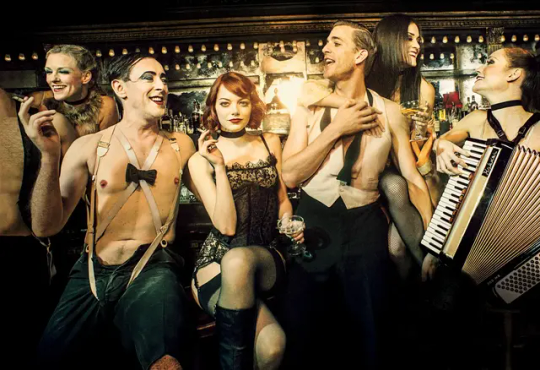
Her boldest stroke has been to reinvent the Emcee. She and Redmayne have turned him into a force of malevolence. He is still sexy and seductive, but as the show goes on, he becomes a skeletal puppet master manipulating the other characters to, in many cases, their doom. If Cumming’s Emcee was, in the end, a Holocaust victim, Redmayne’s is, in Frecknall’s words, “a perpetrator.”
Unwrapping a grilled cheese sandwich in his enormous Upper West Side townhouse, Kander says that his husband had recently asked him a pointed question: “Did it ever occur to you that all of you guys who created Cabaret were Jewish?”
“Not really,” Kander replied. “We were just trying to put on a show.” Or, as Masteroff once said: “It was a job.”
It’s a “job” that has endured. The producers of the Broadway revival certainly have faith in the show’s staying power. They’ve spent $25 million on the production, a big chunk of it going to reconfigure the August Wilson Theatre into the Kit Kat Club. Audience members will enter through an alleyway, be given a glass of schnapps, and can then enjoy a preshow drink at a variety of lounges designed by Scutt: The Pineapple Room, Red Bar, Green Bar, and Vault Bar. The show will be performed in the round, tables and chairs ringing the stage. And they’ll be able to enjoy a bottle (or two) of top-flight Champagne throughout the performance.
This revival is certainly the most lavish Cabaret in a long time. But there have been hundreds of other, less heralded productions over the years, with more on the way. A few months before Russia invaded Ukraine, Cabaret was running in Moscow. Last December, Concord Theatricals, which licenses the show, authorized a production at the Molodyy Theatre in Kyiv. And a request is in for a production in Israel, the first since the show was produced in Tel Aviv in 2014.
“The interesting thing about the piece is that it seems to change with the times,” Kander says. “Nothing about it seems to be written in stone except its narrative and its implications.”
And whenever someone tells him the show is more relevant than ever, Kander shakes his head and says, “I know. And isn’t that awful?”′
You can also listen the entire article here !!
https://www.vanityfair.com/style/cabaret-revival
I know it's a very long article , but very interesting!!
#eddie redmayne#cabaret#cabaret story#theatre#vanity fair#liza minelli#alan cumming#rebecca frecknall#director#gayle rankin#sally bowles#the emcee#nyc#august wilson#broadway#tom scutt#costume designer#scenic theatre#emma stone
20 notes
·
View notes
Text
It's hard to write to a world that doesn't listen, a world that lives with double standards, I try to write but I just stare at the screen in utter disbelief to what humanity has come to.
Israel has bombed South Lebanon many times yet no one hears about it like at all.

The hatred & targeting of Palestinians all over the world right now just for being Palestinian.
Today Israel targeted & killed the 70 year old Palestinian woman who said she was older than the occupation.
No one is speaking, no one is talking, Biden came out in all his white saviour bullshit tweeting about Palestinian children who have cancer & about how he'll save them & get them proper help when he's the one funding the young children's displacement, the bombing of the hospitals & more

And of course we can't forget the Ukrainian president who should be on the side of Palestine cause they're both getting invaded yet he's with Israel going on & on about how the genocide in Palestine (which he didn't call genocide) takes the attention away from Ukraine.
Cause Apparently it's all about a fight for focus & attention not humanity & peace, but after all we can't forget he was an actor who did a photoshoot during the war so of course he's the best when it comes to having attention & focus on him.
Oh and let's not forget New York Times person Of The Year cause in 2022 it was Zelensky himself:
Cause yeah he's fighting a war against the Russian but this year we have mega pop star Taylor Swift, no Palestinians no, and before you attack me, I'm a major swiftie but this just shows the double standards cause as this year's person is not a Palestinian no, it's the same when people came out for Ukraine's support calling for actions against Russia yet no one is talking about Palestine like Selena Gomez who decided to take a break now but when it was Ukraine she was posting & talking about it.
All of this yet the result we get today is Starvation, no electricity, no water, bombing 24/7, hospitals out of control cause they no longer have the capacity for more, dismembered bodies, belongings getting stolen by the IDF & so so much more & what's worse is the Israeli posts their shit all over social media yet the world pretends it's blind!
Everyone have their eyes and ears covered, everyone is funding, some are not even doing the least as boycotting & you wanna see the result?
Here it is:
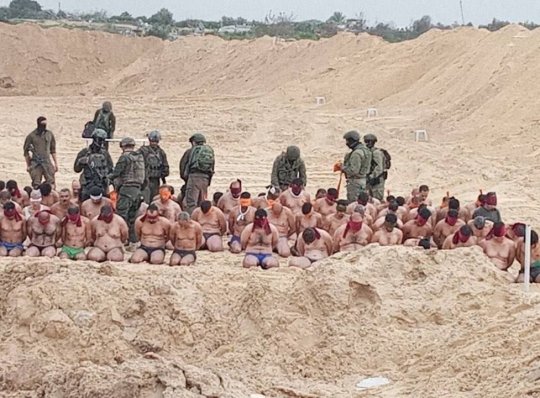
They took their clothes in December, tied them up, covered their eyes & preparing them for a mass execution, these are not Hamas or related to Hamas, these are Palestinian men, they're just men, just humans, like our own men, our guy friends, our boyfriends, our husbands, our brothers, out fathers, they're more than just "men" to their people.
But they're getting executed cause the world refuses to listen or see.
I'm so fucking tired over this.
#Palestine#gaza#israel#israel is a terrorist state#Zelensky#ukraine#new york times#person of the year#taylor swift#selena gomez#Biden#joe biden#from the river to the sea palestine will be free#this is where the American taxes go#lebanon#cancer#children
40 notes
·
View notes
Text
well, @illumiost asked to hear my Russian, so here's me reciting a poem that's very important to me.
This is "Страхи" (Fears) by the Soviet poet Evgeny Evtushenko, written 1962. The poem was set to music for the fourth movement of Shostakovich's 13th Symphony.
The historical context to this poem is vital to understanding it. After Stalin's death in 1953, Khrushchev's government came with some easing of cultural restrictions, and the decline of the "Socialist Realism" art style, most prominent in the 30s-50s. This period of Soviet history is known as the "Thaw." While the Thaw resulted in a rise in avant-garde Soviet art, it was still heavily discouraged, albeit not to the extent that it was during Stalin's time in power; while the fact that this poem makes an appearance in Shostakovich's symphony is indicative of the changing cultural atmosphere, it also faced censorship and controversy (albeit not to the extent of another Evtushenko poem featured in Shostakovich 13, "Babi Yar").
The poem alludes to two major historical events that defined Soviet culture during the Stalin era- the Great Purges (1936-38) and WWII (in the Soviet Union, 1941-45). During the Purges, a culture of fear and distrust grew, and while the war resulted in devastating losses of life, wartime and postwar propaganda pushed an image of Soviet strength and military power. This cognitive dissonance between fear and trauma caused by one's own government, while projecting a cultural image of patriotic might and confidence, is reflected in the poem as well.
Overall, "Страхи" is a poem about the lasting presence of cultural trauma and its consequences for Soviet Russia (and, one could argue, modern Russia). The first and last stanzas contain the line, "Умирают в России страхи" ("in Russia, fears are dying"), but as the rest of the poem states, this is not the case. Fear is still as alive in 1962 as it was in 1936, and it manifests as mistrust and a wariness to speak out against oppression. The poem purposefully contradicts itself multiple times; fears are dying in Russia, but they still permeate Russian society. Russians were unafraid of warfare during WWII, but were terrified of speaking aloud to themselves at home.
Here is my original English translation of "Страхи." It's not a one-for-one literal translation, but I did my best to preserve both the meaning and the original rhyme scheme.
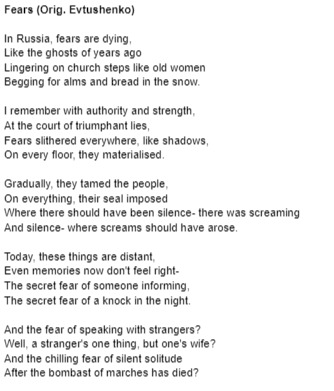

In 2022, before Russia invaded Ukraine, I was taking Russian language classes in college in order to further my music history research. I was invited by my Russian professor to participate in the Evgeny Evtushenko poetry competition, which required Russian learners (both students learning Russian as a foreign language and heritage speakers) to recite a Russian-language poem on a Zoom call. Evtushenko's widow and son were on the judges' panel. As I was familiar with some of his work and knew he collaborated with Shostakovich- a composer whom I had been enamored with researching- I signed up for the competition and chose this poem, as I was already familiar with it from the symphony. My professor was surprised I decided to choose such a long poem with that sort of historical weight to it, but agreed to help coach me with the pronunciation and enunciation.
Reciting this poem in front of her was difficult, even before the war began. My professor grew up in Russia, and I didn't want her to think I was taking the poem lightly by any means; I was dealing with serious subject matter from a culture I was not a part of, and while my historical research had helped me somewhat understand what the poem was about, I knew there was a cultural component to it that I would never be able to fully grasp. However, my professor encouraged me to learn the poem, and urged me not to shrink away from some of the more cutting stanzas.
I was probably halfway through memorizing it when the invasion happened, and that made me gain another layer of understanding. Going on Reddit and reading posts from Russians who had previously dismissed the idea of an invasion of Ukraine as "western propaganda," only to be completely shocked and disillusioned when the invasion actually began, hearing how scared my friends in eastern Europe were, reading news reports of protesters being arrested just for holding anti-war signs, and seeing the war be met with apathy or claims of being "apolitical" by civilians as it went on made it harder to learn and recite the poem, as I was beginning to see just how relevant it was.
One day, I read a news report that a memorial in Babyn Yar, Ukraine, had been damaged by bombing- the site of the 1941 anti-Semitic massacre where, in 1962, as stated in the Shostakovich 13 setting, there "was no monument." When I went to practice the poem that day in front of my professor, I broke down crying. 1936 became 1941 became 1962 became 2022, and that day, I felt as if I had caught a glimpse of the impossible length of history.
I can hardly remember being on the Zoom call and reciting the poem for the Evtushenkos. I couldn't believe I was actually speaking to them, and that they were listening to me recite the words of the famous poet- to them, a husband and father- who had collaborated with the Dmitri Shostakovich on one of the most monumental symphonies of the 20th century. I wish I could have looked at their faces on the screen, but I didn't; I just recited and then listened to the rest of the students read their poems. I didn't win the competition, and didn't even place, but a few weeks later, my Russian professor handed me this small book of Evtushenko poems, which she said the Evtushenko family wanted to give me. It's by far my most prized possession.
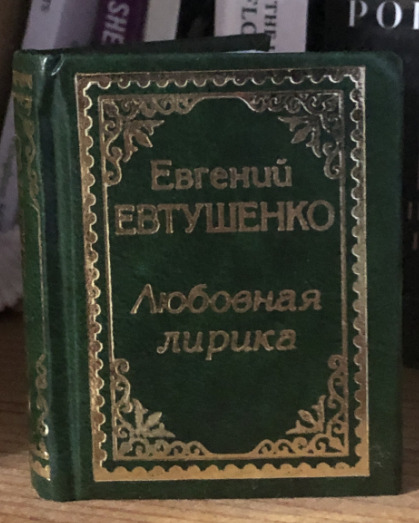
#poetry#russian#russian language#language learning#evgeny evtushenko#evtushenko#yevtushenko#yevgeny yevtushenko#shostakovich#dmitri shostakovich#ukraine#russo ukrainian war#history#current events#long post
53 notes
·
View notes
Text
A new sound wafts through the open windows at night in this town near the front line: children hollering at each other down the block, even long after dark.
The markets are full. Sales are surging at the local bike shop. Red tulips, planted by hand, are bursting open everywhere.
It is remarkable — “Unrecognizable,” one city official said — how different this small town in eastern Ukraine feels from a year ago. Last summer, Pokrovsk was a spooky landscape of boarded up houses and bushy yards. No one was around. Now it’s hard to take a few steps without passing someone on the sidewalk.
Nothing has changed outside Pokrovsk. The front line is still 30 miles away. Ukrainians are still dying in droves. One of the biggest armies in the world, that of the Russian Federation, is still bombing cities while they sleep and trying to take as much territory as it can, at a terrifying cost.
But what has changed — and it reflects something broader happening in small towns across this vast country — are people’s calculations. How much danger are they willing to accept? What is the best for them and their families? How should they accommodate the war on a daily basis? The answers to these questions seem different this year, and without consulting each other, many people have reached the same decision.
It is resilience, yes, but perhaps also something a little less shiny: resignation.
“The war is here. There is no safe place in Ukraine. So you might as well get on with it,” said Dr. Natalia Medvedieva, a family doctor who tried living in a safer place in western Ukraine with her son but came back here a few months later.
And home is home.
“It’s hard to describe what is so special about home,” said Pavel Rudiev, an engineer at Pokrovsk’s small train station. “It’s where everything is familiar, where you know people, where you have friends.”
When Russia invaded Ukraine in February 2022, this principle didn’t hold. More than 13 million Ukrainians — a third of the country — fled from their homes. But as time went on, it became harder to stay away.
“I was running out of money,” said Iryna Ilina, a fitness instructor and beautician, sharing a common struggle of the displaced. She recently returned to Kramatorsk, another city not far from the front line where she owns an apartment. She was having trouble covering her rent in Pavlohrad, the safer city where she had been staying.
Many people said that when they were displaced, it was hard finding work. “And I need to work,” Dr. Medvedieva said. “I have my life.”
Since last summer, at a pretty steady rate, Ukrainians have been returning. More than 5.5 million have gone home, according to the International Organization for Migration, and not just to large cities like Kyiv, the capital, or Dnipro, but to small places as well, even those right behind the front line. While the exodus at the beginning of the war was dramatic and widely covered, the homecomings have been more gradual and haven’t generated nearly the same attention.
Of course there’s concern. Dr. Medvedieva keeps a bag packed with her documents, money and some clothes. Viktoriia Perederii, a veterinarian, who returned to Pokrovsk last year after trying to live in central Ukraine, said that many families bring her their pets to get clean health certificates for international travel in case they need to leave in a hurry.
“It’s difficult to evaluate the risks,” she said. “There is no safe place in Ukraine. Look at Uman,” she added, referring to the recent missile strike that killed 25 people in a city that, until that moment, many Ukrainians had considered perfectly safe.
At this time of year, Pokrovsk is basking in spring. White cherry blossom petals delicately flutter through the air and pile up along the curb in handsome drifts. The long side streets, lined by modest one-story homes with peaked roofs, smell of freshly turned earth. In the gardens out front, women in aprons and headscarves plant flowers — not something you do if you’re about to pack up and flee.
“Business is good,” said Larysa Titorenko, a seed vendor at Pokrovsk’s busy central market. Her racks of happily decorated packets were moving fast — marigolds, melons, radishes, carrots and about eight varieties of cucumber.
Then tears flashed in her eyes. Her daughter’s house had recently been destroyed in a frontline town not far away. “I’m OK, really,” she insisted, wiping her eyes with her sleeve.
This duality is everywhere. People in war do something that most in the world don’t have to — they keep two big thoughts running in their heads at all times: live life as fully and richly as possible and, at the same time, plan for it to be turned upside down.
Since last summer, the Russians have sliced away at Bakhmut, pushed closer to Avdiivka and leveled Marinka — all towns about an hour’s drive away. The front line is inching closer. You constantly hear dull thuds, almost like doors closing.
But people carry on as if it’s a faraway thunderstorm. At a pond-side park near the town center, teenage girls make halos out of dandelions, as they have for eons, and TikTok dance videos.
Nearby, men pump iron at an immaculate outdoor gym with rows of high-quality weight machines, exercise bars and even padded arm-wrestling tables. With wide stances, they strut around, cheeks red, chests puffed out. If you Photoshopped out the occasional tank getting towed past on a car carrier, it might look like California.
Before the war, the population was about 50,000. It dipped to around 30,000 last spring, when so many people across the country fled west. Now it’s back up — to 57,000, actually, said Serhiy Dobriak, the head of Pokrovsk’s military administration. Beyond the residents who have returned, others from surrounding hot spots, Avdiivka or even Mariupol, have flocked in.
Before the war, Pokrovsk had big plans. A billboard rising from a muddy intersection shows a schematic drawing of new office towers and lots of lights. “But we got to be realistic,” Mr. Dobriak said. “We will most likely be a militarized zone.”
No one here expects the war to end soon. “Years” is the reigning prediction. Some worry that the acceptance of it, this notion that life should go on regardless of it, means there will be less pressure to end it.
A military convoy chugged past an intersection, leaving behind a wake of diesel haze. Not far behind, a boy pedaled furiously on his bike, determined to catch up to his friends.
It was evening, warm, and the air was crisp, feeling wonderful on exposed skin. It is such a magnificent time of year that no one wanted to go inside, even with curfew approaching.
#current events#sociology#psychology#russo-ukrainian war#2022 russian invasion of ukraine#ukraine#pokrovsk
79 notes
·
View notes